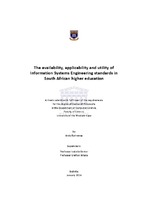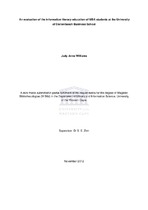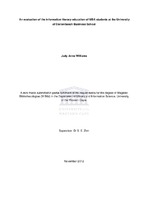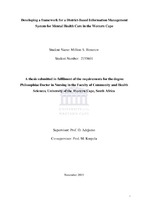The availability, applicability and utility of information systems engineering standards in South African higher education
Abstract
Higher education institutions in South Africa have invested heavily in information technology and information systems, with variable outcomes. Organisations in other sectors, such as engineering, the defence industry, public administration and business, have developed and adopted standards and guides to good practice for the development and operation of software-based systems. In the history of standards-making there was an early vision of the need to extend standardisation beyond software engineering into the world that acquires and uses systems, and yet the overall scope of available standards is still limited. Seeing slow progress in the international committees that develop nationally-endorsed standards (such as ISO-IEC/JTC1/SC7) practitioner communities moved to develop good practice guides such as COBIT and ITIL, that have found considerable interest in progressive organisations. Hence a range of potential guidance is available. In order to assess the extent to which standards and good practice guides might assist higher education, the four tertiary institutions in the Western Cape were approached and a representative range of academic, administrative and managerial individuals agreed to contribute to the study as respondents. Interviews were organised in two parts: the first an open conversation about their involvement with systems, and the second a structured examination of systems-related events that they considered significant. By inspection of those events, bipolar scales were developed by which respondents were able to characterise events (for example as ‘challenging’ or ‘easy’, or as ‘functional’ or ‘dysfunctional’). Respondents rated events on those scales. Repertory Grid analysis was applied so as to investigate which scales correlated with event success. 30 scales (out of 170) proved to be adequately correlated with success, and by principal component analysis they were combined to form nine ‘success scale’ groups, indicating nine areas where the deployment of standards or good practice guides might be expected to lead to more effective use of improved information systems. The study adopted an abductive approach to the work, keeping open the question of what might be the contribution to knowledge. In the event, a new Reference Model emerged from the data analysis that contributes to the effective choice and management of standards and good practice guides .A review of available standards and good practice guides using the new Reference Model concludes that the good practice guides are more applicable than the internationally developed standards, and in some areas management models and frameworks have a contribution to make. The utility of standards, good practice guides and management models will depend on the circumstances and context of use, which are extremely variable. A portfolio approach to the management of information systems provides a means to deal with that variability. It is further found that the IMBOK1 can be used to assess the linkages between information technology, information systems, business processes, business benefits and business strategy. The new Reference Model has a role to play in resolving the need for standards in the four junctions between those five IMBOK domains. Selected standards are assessed in that way, and an illustrative commentary is provided showing how projects and other systems-related initiatives can be assessed using the new Reference Model and the IMBOK.
Collections
Related items
Showing items related by title, author, creator and subject.
-
An evaluation of the information literacy education of MBA students at the University of Stellenbosch Business School
Williams, Judy Anne (University of the Western Cape, 2012)This study investigates the effectiveness of the information literacy education that Master of Business Administration (MBA) students receive at the University of Stellenbosch Business School (USB). The literature reveals ... -
An evaluation of the information literacy education of MBA students at the University of Stellenbosch Business School
Williams, Judy Anne (UWC, 2012)This study investigates the effectiveness of the information literacy education that Master of Business Administration (MBA) students receive at the University of Stellenbosch Business School (USB). The literature reveals ... -
Developing a framework for a district-based information management system for mental health care in the Western Cape
Bimerew, Million S (University of Western Cape, 2013)A review of the literature has shown that there is a lack of mental health information on which to base planning of mental health services and decisions concerning programme development for mental health services. Several ...




